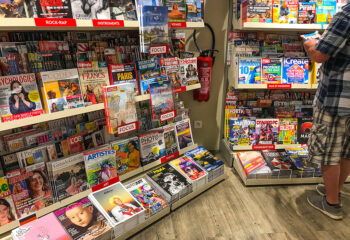More and more online publications now offer the option to listen to a recording of the article. To have quality writing read to us by professional voices is, obviously, desired and enjoyed by many and we are delighted to see it proliferate.
Choice Magazine Listening (CML) predates this trend by about five decades, and it continues to provide a curated collection of quality writing from over 100 magazine publications. The collection comes together thanks to the dedicated and experienced team at CML. This publication has been available to people with vision loss, and other reading difficulties, since 1962, through the National Library Service (NLS).

It’s Time to DOWNLOAD Our Spring 2024 Issue
CML News
In preparation for CML’s upcoming Annual Board Meeting in NYC in April 2024, we gather together the previous years’ tables of contents, newsletters, and “happy quotes” from our subscribers, and share them with our board members. In reviewing these, we are again reminded of the broad scope of topics and ranges of emotions that are represented in the stories, poems, articles, and essays we shared with you, and the impact that such words and information may have. We hope what shines through all the noise of the everyday world is the simple truth that as humans, we are more alike than different. Here’s to finding the connections.
Highlights
There’s an old song that says, “Spring can really hang you up the most.” The weather can be gray and dreary dull, or else gives you a brief taste of sun and rebirth only to return to days of endless rain. But eventually, those flowers do bloom, those birds do return, and summer is just around the corner. Many of the problems we had in winter are still with us—the ongoing suffering in Gaza, the war in Ukraine, high anxiety as the US elections near. We hope that CML’s selection of literature, essays, and general interest pieces, can help make some sense out of our current world as well as entertain and even, occasionally, provide comfort.
Our poetry and fiction in this issue are particularly strong, starting with a poem by the great English poet, W.H. Auden. “In Memory of Sigmund Freud” is one of Auden’s most poignant poems, written in the late 1930’s as World War II loomed on the horizon and Fascism took brutal hold in Spain, Italy, and Germany. Auden’s poem resonates with us today, in our own troubled world, as he speaks of the “frailty of our conscience and anguish” and of the “many we shall have to mourn.”
In addition to poems by Fiona Benson, Daniela Danz, Shane McCrea, Diane Seuss, we acknowledge the passing of two major American poets, Louise Glück (1943–2023) and Charles Simic (1938–2023). Glück is touchingly remembered by her friend, the poet Dan Chiasson, while Henri Cole conducts an extraordinary interview with Glück, in which we learn about her life and writing processes in her own words. Simic’s “Five Final Poems” are startlingly brief, stark, and penetrating.
As for fiction, the three short stories in this issue are each uniquely powerful. Emily Crossen’s “The Bloody Parts” takes us relentlessly through the pain and ecstasy of parturition as a young pregnant artist is trapped in the home of her seemingly unempathetic and withdrawn friend, herself an artist and recent mother. Madeline ffitch’s “Stump of the World” is a moving portrait of a mother and her disaffected adolescent son in a decaying American town, with a surprise, transcendent ending. Brandon Taylor’s “That’s The Pain You Have” employs dual points of view as two lonely, bruised young men come to the perilous, intensely fraught brink of love.
CML is not all doom and gloom, however! Among our lighter, entertaining pieces you will find a review of Barbra Streisand’s recent 970-page autobiography by Radhika Jones, “The Streisand Effect.” In “Jane Austen Gets Dressed,” Kathryn Hughes explores how a study of the great novelist’s wardrobe reveals a new understanding not only about her body (her tallness was unusual for her time) but also her economic and social life as an unwed woman in her brother’s home. And, did you know that the Central Intelligence Agency has its own creative writing workshop? In “Invisible Ink: At the CIA’s Creative Writing Group,” Johannes Lichtman describes his strange day at CIA headquarters in Northern Virginia.
Science fascinates us at CML. Among our science pieces in this issue is Kim Tingley’s “The Gravity of the Situation,” which considers the long-term effects of space travel on the human body, especially when exposed to variable gravity and radiation. And Rowan Jacobsen’s “Minds Everywhere” blew our minds! As humans, we privilege the brain for its intellectual abilities. But there are creatures such as the planarian flatworm that can regrow their heads and brains if decapitated—and even restore the memories once contained in the former head! We should all be so lucky.
Top Picks
In “His Body of Work,” Doug Crandell gives us a vivid, almost tactile portrait of his father, who for most of his life was a farmer as well as a blue-collar worker in an Indiana tile factory. Crandell conveys his father’s strength, but also the bruises that his body endured through years of physical labor both on the farm and in the factory, not least exposure to asbestos. Crandell evokes the world of blue-collar life with extraordinary empathy and detail.
How is Russia surviving the slew of international sanctions in the wake of its invasion of Ukraine? Italian journalist Marzio G. Mian, an expert on Russian culture, takes us along the Volga River in “Beyond the New Iron Curtain.” While Mian reveals the country’s confounding economic resilience, he also exposes the fatalism and denialism of many of its citizens, some of whom look back to the Stalinist period as a golden age and long for a return of Russia’s former superpower status.
The D-B Beat
Frequently we find ourselves dealing with a bumper crop of articles on a shared subject. Typically, we use these as an opportunity to sharpen our analysis of the respective pieces’ writing styles and presentations of the subject, and pick only the strongest among them—as a way to honor our subscribers’ time, and acknowledge that there is just so much happening in the world that we deserve to know, and learn deeply, about. In this issue, however, we chose to make an exception. Two of the pieces early in the lineup both commemorate American essayist, poet, and Nobel Laureate Louise Glück. The first is shorter, adoring, and impressionistic; the second, an in-depth conversation, sadly left unfinished, excavating her personal history, her life’s work and its motivations. We hope you’ll find both to your liking and finish the issue wanting more. If that’s the case, you can ask your local reader advisor about the following titles:
- Meadowlands (DB43058)
- Faithful and Virtuous Night (DB101237)
- The Wild Iris (DB37600)
- Winter Recipes from the Collective (DB106655)
- American Originality: Essays on Poetry (DB101223)







